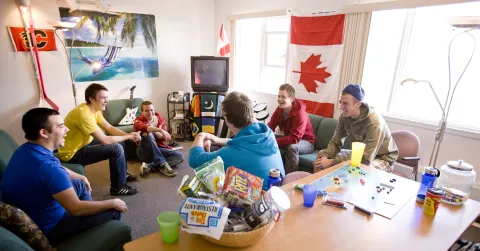Accommodation
Finding a place to stay, including short-term accommodations for when you arrive, is your responsibility. If you have questions, feel free to contact us.

A number of dining plan options are available to you if you elect to live in residence; purchasing a dining plan may be mandatory if you are a new student living in Mt Blakiston House, University Hall or Piikani house, since these are room and board programs.
Advantages of living on campus
- Convenience: you will be in close proximity to your classrooms and University facilities
- Simplicity: you will be able to avoid the hassle of monthly rent/utility payments
- Community: you will have the opportunity to meet new people, make new friends, and engage in social activities
On-campus accommodations is great for single students, but if you are bringing your spouse or child(ren) with you, you will need to look for off-campus housing.
On-campus housing is in high demand, so if you are interested, you should apply early. You can apply for residence as soon as you’ve applied for admission and have received your uLethbridge student ID number. Once you’ve applied for residence, make sure to let your International Student Advisor know.
For more information on types of on-campus accommodation and prices, see here.
You may be interested in applying to live with a host family through the Canada Homestay Network (CHN). Your host family will welcome you into their home for the duration of the contract. You will be provided with:
- A private, furnished bedroom in a safe, comfortable, and friendly environment
- Three meals a day (Typically students will prepare their own breakfast & lunch and host prepares dinner)
You will be expected to:
- Respect your host family as you would your own family
- Abide by household rules
- Make contributions to the household, such as participating in chores or assisting in meal preparation
The homestay program is a means of facilitating cross-cultural exchange while ensuring that boarding costs are covered and that students experience what it is like to be a member of a Canadian household. It is a great way to experience cultural values and lifestyle in Canada.
For more information and to set up your homestay placement please contact the Canada Homestay Network directly.
You might need short-term accommodations if you plan to arrive in Lethbridge before your designated move-in day for on-campus housing, or if you need time to look for somewhere to live off-campus.
Here are some short-term accommodation ideas:
Hotels
There are many hotel options in Lethbridge, though unfortunately there are currently no year-round hotels located near campus on the west side of the city. The closest hotels are located across the river in downtown Lethbridge.
Homestay
Short-term homestay can be arranged through Homestay.com. With this option, you will stay with locals. You can search the listings for couples or families. Typically, some meals are included in your stay. This is often a more affordable option than a hotel, but your privacy will be limited, since you will be staying in someone’s home.
Vacation Rentals
Short-term accommodations can be found on websites like Airbnb. You can rent a home, or just a private room. Hosts are reviewed by previous guests, so make sure to read the reviews so that you know what to expect.
